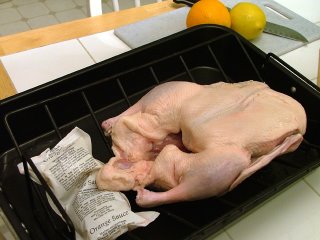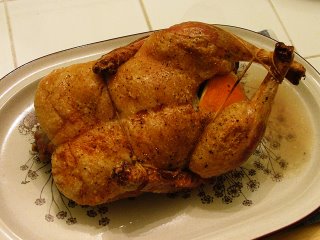 The girlfriend came over for dinner tonight, and I decided to make the classic French dish Duck à l'Orange. It was hugely popular in the 60s and 70s yet seems to have fallen out of favor. I'm cooking it simply because fresh ducks are on sale right now for $10 a bird and I've never made (or eaten) this particular dish. Plus, it's another one I can check off from the Les Halles Cookbook. This project has been loads of fun, and delicious as well. The inspiration comes in part from Julie Powell's book Julie and Julia: 365 Days, 524 Recipes, 1 Tiny Apartment Kitchen. I haven't actually read it, but followed the project online and in news reports. Parker spent a year methodically cooking her way through Julia Child's Mastering the Art of French Cooking, Volume One. Anthony Bourdain isn't Julia Child, and I'm not going to cook everything in his cookbook, but I'm picking up a lot of new techniques and flavor combinations that I look forward to incorporating in future dishes.
The girlfriend came over for dinner tonight, and I decided to make the classic French dish Duck à l'Orange. It was hugely popular in the 60s and 70s yet seems to have fallen out of favor. I'm cooking it simply because fresh ducks are on sale right now for $10 a bird and I've never made (or eaten) this particular dish. Plus, it's another one I can check off from the Les Halles Cookbook. This project has been loads of fun, and delicious as well. The inspiration comes in part from Julie Powell's book Julie and Julia: 365 Days, 524 Recipes, 1 Tiny Apartment Kitchen. I haven't actually read it, but followed the project online and in news reports. Parker spent a year methodically cooking her way through Julia Child's Mastering the Art of French Cooking, Volume One. Anthony Bourdain isn't Julia Child, and I'm not going to cook everything in his cookbook, but I'm picking up a lot of new techniques and flavor combinations that I look forward to incorporating in future dishes. Back to the duck. The picture above is our five pound White Pekin, fresh and never frozen. You'll notice that this bird came with a packet of pre-made orange sauce. This was tossed out unopened. No cheating here. This is also before trimming. I cut off all the excess skin (and rendered out the fat--more on that in a bit), cut off the wing tips and set them aside with the liver and neck. Without any duck stock on hand, I boiled down a quart of chicken stock with those scraps in there for flavor and body.
 Here's what the final roasted duck looked like, stuffed with cut up lemons and oranges, trussed up and dusted with salt and pepper. Total roasting time was around two hours, a half hour at a lower temperature and one and a quarter at a higher temperature. While the bird was roasting, I was pretty busy. The sauce was quite complex, involving many different steps and ingredients, and on top of that, I had decided to render down duck fat for use in roasted potatoes. I'm not going to get into all of the details of the sauce right now, but for the potatoes, I cut up two russet potatoes and coated them in salt, pepper, fresh rosemary, and tossed them with a half cup of freshly rendered duck fat, one of the most delicious substances known to mankind. I've roasted potatoes with butter and olive oil before, but the duck fat is sublime. (If I were taking a photo in the 70s, this duck would have been coated and glazed in the thickened sauce; it would be surrounded by piped rosettes of mashed potatoes, a ring of orange slices, and perhaps some vegetables slightly glistening in aspic. My copy of the Larousse Gastronomique is full of such presentations.)
Here's what the final roasted duck looked like, stuffed with cut up lemons and oranges, trussed up and dusted with salt and pepper. Total roasting time was around two hours, a half hour at a lower temperature and one and a quarter at a higher temperature. While the bird was roasting, I was pretty busy. The sauce was quite complex, involving many different steps and ingredients, and on top of that, I had decided to render down duck fat for use in roasted potatoes. I'm not going to get into all of the details of the sauce right now, but for the potatoes, I cut up two russet potatoes and coated them in salt, pepper, fresh rosemary, and tossed them with a half cup of freshly rendered duck fat, one of the most delicious substances known to mankind. I've roasted potatoes with butter and olive oil before, but the duck fat is sublime. (If I were taking a photo in the 70s, this duck would have been coated and glazed in the thickened sauce; it would be surrounded by piped rosettes of mashed potatoes, a ring of orange slices, and perhaps some vegetables slightly glistening in aspic. My copy of the Larousse Gastronomique is full of such presentations.) Here's the final plate. Typically whenever I take pictures like this, it's of the plate I actually eat. I serve my guests first, then set my plate, take a picture, and then get down to business. Here I've got myself a breast and a leg, covered in the orange sauce (plenty of long strips of orange zest visible on top), the roast potatoes, and a stalk of steamed broccoli. The sauce was thinner than I expected, but rich and savory considering everything that went into it (my improvised stock, red wine vinegar, orange liqueur, orange and lemon juice, orange zest, the pan drippings from the roasting pan, butter, and other things I'm forgetting). Everything was delicious, and I froze all the bones and scraps for use in making stock at a later date.
Here's the final plate. Typically whenever I take pictures like this, it's of the plate I actually eat. I serve my guests first, then set my plate, take a picture, and then get down to business. Here I've got myself a breast and a leg, covered in the orange sauce (plenty of long strips of orange zest visible on top), the roast potatoes, and a stalk of steamed broccoli. The sauce was thinner than I expected, but rich and savory considering everything that went into it (my improvised stock, red wine vinegar, orange liqueur, orange and lemon juice, orange zest, the pan drippings from the roasting pan, butter, and other things I'm forgetting). Everything was delicious, and I froze all the bones and scraps for use in making stock at a later date.  The wine tonight was nothing terribly special, a $6 bargain picked out of the closeout rack. I enjoyed the Washington State Grizz Red back in March, and decided to give the white version a try. The 2004 Grizz White is made from 90% Chardonnay and 10% Semillon grown in the Columbia Valley. Screwcap enclosure. It's rather full-bodied and fruity, with medium acidity. Some fizz clings to the side of the glass. A little apple and honey linger on the palate, but otherwise it's an uncomplicated, simple Chardonnay. I remember one of the first non-sweet white wines I really liked was a Chardonnay-Semillon blend from Columbia Crest. It's pictured with a loaf of pain rustique from the grocery store, though honestly it's just a big piece of focaccia.
The wine tonight was nothing terribly special, a $6 bargain picked out of the closeout rack. I enjoyed the Washington State Grizz Red back in March, and decided to give the white version a try. The 2004 Grizz White is made from 90% Chardonnay and 10% Semillon grown in the Columbia Valley. Screwcap enclosure. It's rather full-bodied and fruity, with medium acidity. Some fizz clings to the side of the glass. A little apple and honey linger on the palate, but otherwise it's an uncomplicated, simple Chardonnay. I remember one of the first non-sweet white wines I really liked was a Chardonnay-Semillon blend from Columbia Crest. It's pictured with a loaf of pain rustique from the grocery store, though honestly it's just a big piece of focaccia.Final thoughts: this dish was a lot of work, and at the end of the night I'm covered from head to toe in a fine film of duck grease. However, dinner was fantastic, and the entire house smells like Christmas. We never ate duck when I was a kid, so maybe I'm just conflating descriptions I read in old Victorian stories, but the smell of roast duck and oranges provides a warm, succulent, and slightly spicy aroma that is perfect for the holidays.

No comments:
Post a Comment